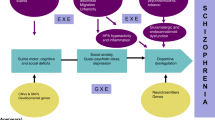The role of the VNTR polymorphism of the AS3MT gene in determining the clinical features of schizophrenia and schizophrenic spectrum disorders was studied. The analysis included 670 individuals. We found no differences in PANSS scores for positive, negative, and common psychopathological symptoms between the carriers of different genotypes. The interaction of the studied polymorphism and obstetrical complications as an environmental factor was found. The genotype-environment interactions were identified for one of the characteristics reflecting the severity of schizophrenia: the level of negative symptoms. Women with the V2/V2 genotype, who have obstetrical complications, showed significantly higher negative symptoms scores, which was associated with a poor prognosis of the disease.
Similar content being viewed by others
References
Berezantsev AYu. Gender differences in the clinical manifestations and course of schizophrenia: neurobiological and psychosocial aspects. Nevrologiya, Neiropsikhiatriya, Psikhosomatika. 2017;9(4):77-81. Russian.
Evtushenko ID, Krasnonosenkikh TP, Balashov PP. Mental diseases associated with pregnancy and labor courses. Byull. Sib. Otdel. Ross. Akad. Med. Nauk. 2003;23(2):9-11. Russian.
Khamenka NV. Genetic and environmental factors in the development of schizophrenia. Med. Zh. 2012;(2):15-18. Russian.
Dieset I, Andreassen OA, Haukvik UK. Somatic comorbidity in schizophrenia: some possible biological mechanisms across the life span. Schizophr. Bull. 2016;42(6):1316-1319.
Duarte RRR, Troakes C, Nolan M, Srivastava DP, Murray RM, Bray NJ. Genome-wide significant schizophrenia risk variation on chromosome 10q24 Is associated with altered cis-regulation of BORCS7, AS3MT, and NT5C2 in the human brain. Am. J. Med. Genet. B Neuropsychiatr. Genet. 2016;171(6):806-814.
Kunugi H, Nanko S, Murray RM. Obstetric complications and schizophrenia: prenatal underdevelopment and subsequent neurodevelopmental impairment. Br. J. Psychiatry Supp. 2001;40:s25-s29.
Li L, Chang H, Peng T, Li M, Xiao X. Evidence of AS3MTd2d3-associated variants within 10q24.32-33 in the genetic risk of major affective disorders. Mol. Neuropsychiatry. 2017;2(4):213-218.
Li M, Jaffe AE, Straub RE, Tao R, Shin JH, Wang Y, Chen Q, Li C, Jia Y, Ohi K, Maher BJ, Brandon NJ, Cross A, Chenoweth JG, Hoeppner DJ, Wei H, Hyde TM, McKay R, Kleinman JE, Weinberger DR. A human-specific AS3MT isoform and BORCS7 are molecular risk factors in the 10q24.32 schizophrenia-associated locus. Nat. Med. 2016;22(6):649-656.
Riley B, Kendler KS. Molecular genetic studies of schizophrenia. Eur. J. Hum. Genet. 2006;14(6):669-680.
Schizophrenia Working Group of the Psychiatric Genomics Consortium. Biological insights from 108 schizophrenia-associated genetic loci. Nature. 2014;511:421-427.
Stefansson H, Ophoff RA, Steinberg S, Andreassen OA, Cichon S, Rujescu D, Werge T, Pietiläinen OP, Mors O, Mortensen PB, Sigurdsson E, Gustafsson O, Nyegaard M, Tuulio-Henriksson A, Ingason A, Hansen T, Suvisaari J, Lonnqvist J, Paunio T, Børglum AD, Hartmann A, Fink-Jensen A, Nordentoft M, Hougaard D, Norgaard-Pedersen B, Böttcher Y, Olesen J, Breuer R, Möller HJ, Giegling I, Rasmussen HB, Timm S, Mattheisen M, Bitter I, Réthelyi JM, Magnusdottir BB, Sigmundsson T, Olason P, Masson G, Gulcher JR, Haraldsson M, Fossdal R, Thorgeirsson TE, Thorsteinsdottir U, Ruggeri M, Tosato S, Franke B, Strengman E, Kiemeney LA; Genetic Risk and Outcome in Psychosis (GROUP), Melle I, Djurovic S, Abramova L, Kaleda V, Sanjuan J, de Frutos R, Bramon E, Vassos E, Fraser G, Ettinger U, Picchioni M, Walker N, Toulopoulou T, Need AC, Ge D, Yoon JL, Shianna KV, Freimer NB, Cantor RM, Murray R, Kong A, Golimbet V, Carracedo A, Arango C, Costas J, Jönsson EG, Terenius L, Agartz I, Petursson H, Nöthen MM, Rietschel M, Matthews PM, Muglia P, Peltonen L, St Clair D, Goldstein DB, Stefansson K, Collier DA. Common variants conferring risk of schizophrenia. Nature. 2009;460:744-747.
Author information
Authors and Affiliations
Corresponding author
Additional information
Translated from Byulleten’ Eksperimental’noi Biologii i Meditsiny, Vol. 168, No. 7, pp. 96-99, July, 2019
Rights and permissions
About this article
Cite this article
Korovaitseva, G.I., Gabaeva, M.V., Yunilainen, O.A. et al. Effect of VNTR Polymorphism of the AS3MT Gene and Obstetrical Complications on the Severity of Schizophrenia. Bull Exp Biol Med 168, 84–86 (2019). https://doi.org/10.1007/s10517-019-04653-3
Received:
Published:
Issue Date:
DOI: https://doi.org/10.1007/s10517-019-04653-3




